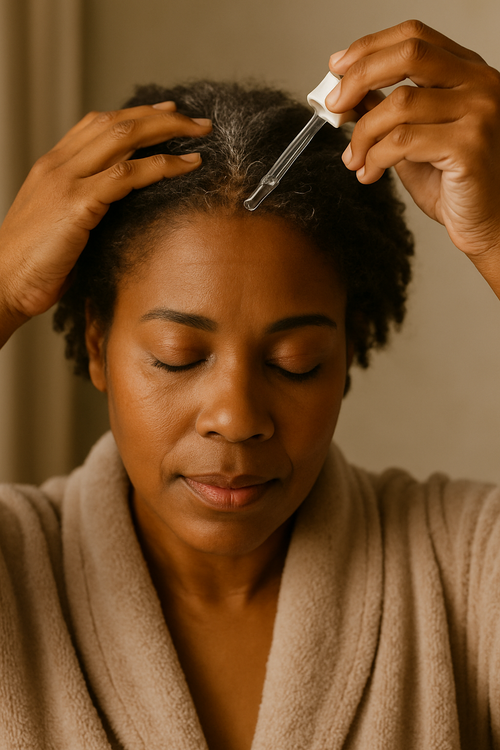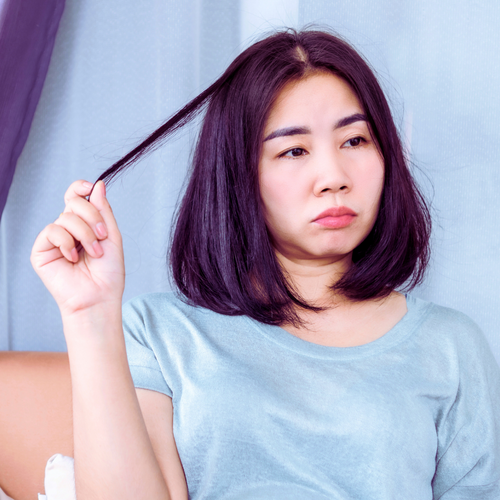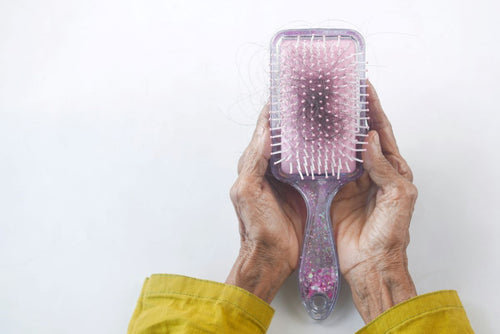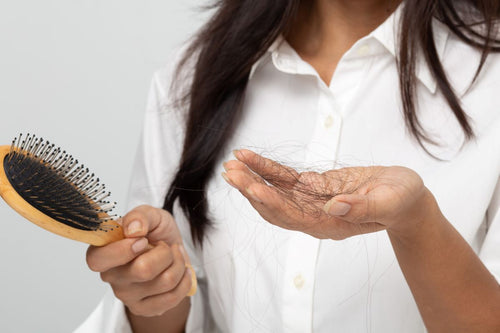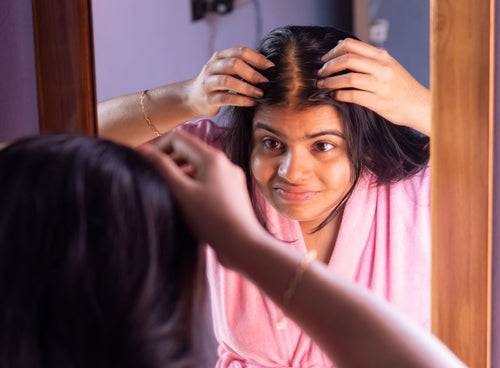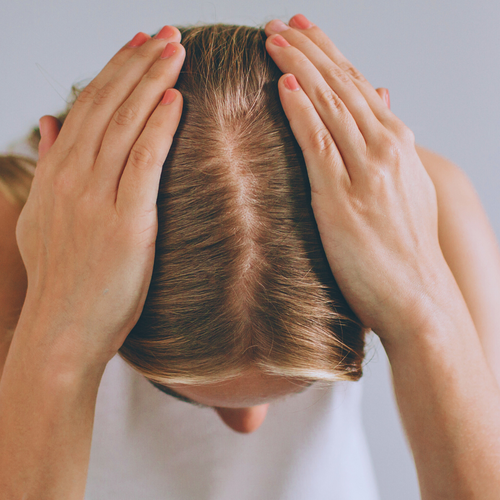Stress is an inevitable part of life, but did you know that it can have a direct impact on your hair health? Experiencing stress—whether it’s physical, emotional, or mental—can lead to hair loss, a condition that can be both alarming and frustrating. In this comprehensive guide, we’ll explore hair loss from stress, the science behind it, and what you can do to protect your hair. Let’s dive into everything you need to know about hair loss from stress and how to manage it.
Understanding the Connection Between Stress and Hair Loss
Hair loss from stress is a phenomenon that many people experience at some point in their lives. But how exactly does stress lead to hair shedding? To understand this, let’s first look at how hair grows.
Your hair follicles go through a natural cycle that includes a growth phase (anagen), a resting phase (telogen), and a shedding phase (catagen). Typically, around 90% of your hair is in the anagen phase, growing and thriving. However, when you experience significant stress, your body’s hormonal balance can be disrupted, pushing a large portion of your hair follicles prematurely into the telogen phase. This leads to telogen effluvium, a type of hair loss that is triggered by stress.

Types of Hair Loss from Stress
Stress can trigger several forms of hair loss, some of which are temporary and reversible, while others may require targeted treatment. Understanding the types of stress-related hair loss can help you identify the most appropriate solution for your needs.
1. Telogen Effluvium
Telogen Effluvium is one of the most common forms of hair loss caused by stress. This condition occurs when significant physical or emotional stress pushes a large number of hair follicles into the resting (telogen) phase. After a few months, those hairs fall out, leading to noticeable thinning. While this type of hair loss is usually temporary, it can take months for new hair to grow back.
2. Alopecia Areata
Alopecia Areata is an autoimmune condition often triggered by stress. It causes the immune system to mistakenly attack hair follicles, leading to round patches of hair loss on the scalp. In some cases, the hair will grow back on its own, while in others, more intensive treatments may be required.
3. Trichotillomania
Trichotillomania is a hair-pulling disorder linked to stress and anxiety. People with this condition feel a compulsive need to pull out their hair, often resulting in patchy hair loss on the scalp, eyebrows, or other parts of the body.
4. Traction Alopecia
Traction Alopecia is a type of hair loss caused by repeated physical stress on the hair, such as tight hairstyles (like ponytails, braids, or wigs). Over time, this tension weakens the hair follicles, especially around the hairline, leading to thinning or permanent hair loss.
If you experience thinning around your edges due to traction alopecia, or if you tend to wear tight hairstyles, a targeted solution may help. Our Revita+Fol scalp serum can be a powerful addition to your scalp care routine. Infused with stress-relieving adaptogens and natural bioactive botanicals, it not only supports healthy hair growth but also helps combat stress, one of the root causes of traction alopecia. By massaging the serum into your edges twice daily, you can stimulate circulation, nourish the scalp, and combat stress-related hair loss around the hairline.
The Science Behind Hair Loss from Stress
When your body is under stress, it produces hormones like cortisol and adrenaline, which can disrupt the hair growth cycle. Here’s a breakdown of how this process works:
- Increased Cortisol Levels: High cortisol levels can shorten the anagen phase, leading to premature hair shedding.
- Hormonal Imbalance: Stress can cause imbalances in other hormones, such as thyroid hormones and sex hormones, which can further contribute to hair thinning.
- Nutrient Depletion: Stress can deplete essential nutrients in the body, like B vitamins, zinc, and iron, which are crucial for healthy hair growth.
How Long Does Hair Loss from Stress Last?
Hair loss from stress is usually temporary, but it depends on how long the stressful period lasts and how quickly you manage to address the stress. Most people experience noticeable shedding 3 to 6 months after a stressful event. Once stress is reduced, hair growth often resumes naturally, though it can take several months to see a full recovery.
Symptoms of Hair Loss from Stress
Wondering whether your hair loss is due to stress? Here are common signs of hair loss from stress:
- Increased hair shedding (more than 100 hairs a day)
- Hair thinning, especially around the temples or crown
- Sudden appearance of bald patches
- Overall decrease in hair volume
If you’ve experienced these symptoms and are dealing with a significant life event, chronic stress, or changes in health, stress may very well be the culprit.
How to Prevent and Manage Hair Loss from Stress
While stress is often unavoidable, there are several strategies you can implement to protect your hair and manage hair loss from stress.
1. Manage Stress Levels
Finding ways to reduce stress is key. This could include meditation, spending time outside, yoga, regular exercise, or practicing mindfulness. Consider setting aside time each day to relax and recharge. Reducing stress won’t just benefit your hair but also your overall health.
2. Nourish Your Body
Proper nutrition is essential for healthy hair. Make sure your diet includes plenty of vitamins and minerals, particularly B vitamins, iron, and zinc, which support hair growth. Consider incorporating adaptogens into your routine, such as ashwagandha and holy basil, which help regulate cortisol levels.
3. Support Your Scalp
Hair health starts with a healthy scalp. Develop a scalp care routine using an adaptogenic serum to help combat stress. Using products that contain calming essential oils, like neroli and lavender, can provide aromatherapy stress relief while supporting the scalp’s health.
4. Seek Professional Help
If your hair loss is severe or persistent, consider consulting a dermatologist. They can assess your hair and scalp condition, and help you determine the best course of action.

When Should You Worry About Hair Loss from Stress?
While stress-related hair loss is often temporary, there are times when you should seek medical advice. If your hair loss is accompanied by other symptoms such as fatigue, weight changes, or skin problems, it could indicate an underlying health issue. Additionally, if your hair isn’t growing back after six months, it may be time to consult a healthcare professional.
Frequently Asked Questions
Can hair loss from stress be reversed?
Yes, hair loss from stress can often be reversed. Once the underlying stress is managed, your hair can start growing back. This process, however, may take several months, depending on the severity of the hair loss.
How long does it take for hair to grow back after stress?
It typically takes 3 to 6 months for hair to start regrowing after stress. Full regrowth may take up to a year, depending on how quickly you manage the stress and how your body responds.
Are there any treatments for hair loss from stress?
There are several treatments to support hair regrowth, including topical treatments, supplements, and lifestyle changes to reduce stress. Scalp serums that contain essential oils like neroli and rose can support both stress relief and hair health. Scalp massage can be beneficial for promoting circulation and reducing anxiety.
Can tight hairstyles really cause hair loss?
Yes, wearing tight hairstyles like braids, ponytails, and buns can lead to a condition called traction alopecia, which results in thinning hair around the edges and hairline. If you wear tight hair styles or are experiencing hair loss due to traction, consider loosening your hairstyles and incorporating an adaptogenic serum to nourish the scalp and support hair regrowth.
Can stress cause permanent hair loss?
In most cases, hair loss from stress is temporary. However, if stress is chronic or severe, it can lead to more permanent forms of hair loss, such as alopecia areata or androgenetic alopecia.
How can I prevent stress-related hair loss in the future?
To prevent stress-related hair loss, focus on managing your stress levels, eating a balanced diet, and using hair care products that nourish both your scalp and your hair. Regular self-care practices, such as aromatherapy with calming essential oils, can also be beneficial.
Takeaway
Stress can significantly impact hair health, leading to various types of hair loss, including telogen effluvium, traction alopecia, and more. Understanding how hair loss from stress occurs can help you take proactive steps to address it. Incorporating stress-reducing practices, such as aromatherapy and using adaptogenic products, can support hair health. Reducing stress not only benefits overall wellness but also plays a crucial role in maintaining healthy hair growth.



